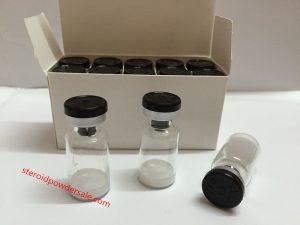
Peptide hormones are hormones that consist of amino acids. Peptide hormones can be among the intracellular signalling peptides and proteins, and can include insect hormones, gastrointestinal hormones and thyroid hormones, but their actions are not limited to individual cells and they can act systemically.
Peptide hormones are those made up from polypeptide chains. Peptide hormones can either have short polypeptide chains, such as in oxytocin, or longer protein chains such as those in growth factors. Peptides that are to be secreted are stored with in vesicles inside the cell. Their release is initiated in response to stimuli. An example of one of these proteins is insulin, it is released in response to rising blood glucose levels .
One feature of petide hormones is that they are souble in water. This allows them to dissolve in blood plasma for transportation around the body. Another feature is that they can’t travel through the plasma membrane of cells. Therefore their receptors are found on the surface of cells.
“Peptide hormones” are protein hormones made of as many as 50 amino acids; the proteins or “peptide hormones” circulate in the blood and have metabolic effects in the body. Some examples of peptide hormones include prolactin, IGF-1, growth hormone (including HGH), growth hormone–releasing peptides, human chorionic gonadotrophic hormone (commonly known as HCGH), and erythropoietin (EPO). Like anabolic hormones, the abuse of peptide hormones can cause serious health problems. More important, most of them are not legal for use in dietary supplements.
The labeling of some of dietary supplement products related to peptide hormones can be very confusing. Website advertising may state the product contains or promotes specific peptide hormones, and the product name may even include the name of the hormone, while the Supplement Facts panel doesn’t actually list any such hormones.
According to the scientific literature, orally consumed peptide hormones won’t pass into the bloodstream in healthy adults, which means they can’t have any desirable effect. This is because they are broken down during digestion into their amino acids. However, some companies market these products as being delivered buccally or sublingually (through the membranes of the cheek inside the mouth or under the tongue). In addition they may be offered as a transdermal patch, skin cream, or even injection. By definition, these “non-oral” products are not dietary supplements. In any case, peptide hormones in dietary supplements and other forms pose a serious health and safety risk; they should be avoided.
The integration of body functions in humans and other higher organisms is carried out by the nervous system, the immune system, and the endocrine system. The endocrine system is composed of a number of tissues that secrete their products, endocrine hormones, into the circulatory system; from there they are disseminated throughout the body, regulating the function of distant tissues and maintaining homeostasis. In a separate but related system, exocrine tissues secrete their products into ducts and then to the outside of the body or to the intestinal tract. Classically, endocrine hormones are considered to be derived from amino acids, peptides, or sterols and to act at sites distant from their tissue of origin. However, the latter definition has begun to blur as it is found that some secreted substances act at a distance (classical endocrines), close to the cells that secrete them (paracrines), or directly on the cell that secreted them (autocrines). Insulin-like growth factor-I (IGF-I), which behaves as an endocrine, paracrine, and autocrine, provides a prime example of this difficulty.